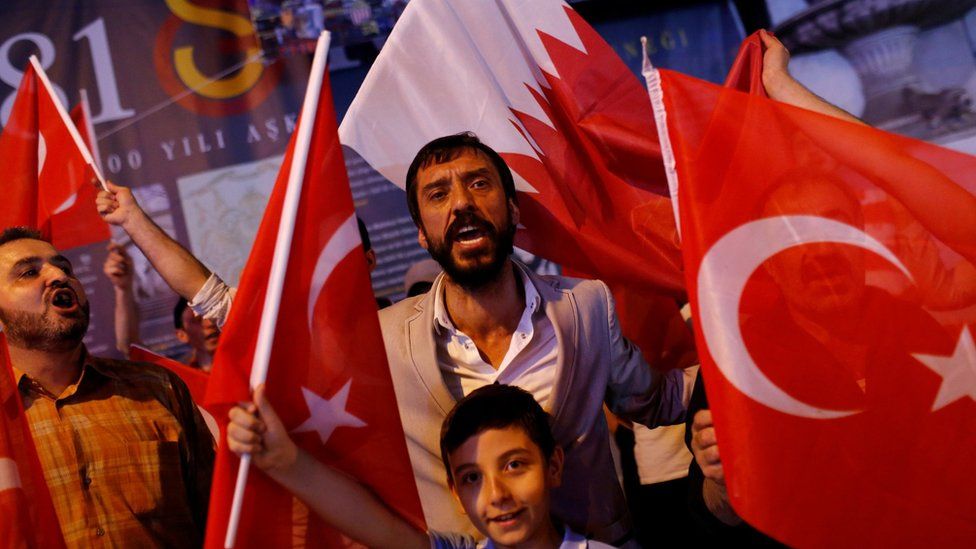Turkey's Erdogan decries Qatar's 'inhumane' isolation
- Published

Turkish President Recep Tayyip Erdogan has denounced the isolation of Qatar by several Arab states, describing it as "inhumane and against Islamic values".
Last week's decision by Saudi Arabia, Bahrain, the United Arab Emirates and Egypt to sever all ties was like a "death penalty", Mr Erdogan said.
Qatar was accused of aiding terrorist groups and Iran - charges it denied.
Mr Erdogan vowed to help Qatar overcome the effects of the crisis, which he said Saudi Arabia needed to resolve.
Turkey has already flown dairy products, poultry and juice to Doha, which began to arrive on supermarket shelves over the weekend.
Morocco, which has said it will remain neutral in the dispute, announced on Monday evening that it would also send planeloads of food to prevent shortages.
The decision was made "in conformity with Islamic precepts that call for solidarity and mutual aid between Muslim people, notably during this holy month of Ramadan", according to a foreign ministry statement.
On 5 June, Saudi Arabia, Bahrain, the UAE and Egypt announced that they were severing air, sea and land links with Qatar. The three Gulf states also ordered their citizens out of Qatar and gave Qataris in their countries 14 days to leave.
The decision caused turmoil in Qatar, an oil- and gas-rich nation that is dependent on imports to meet the basic needs of its population of 2.7 million and is a major international travel hub.
In a speech at a parliamentary meeting in Ankara on Tuesday, Mr Erdogan said the methods employed by Qatar's neighbours were unacceptable.
"A very grave mistake is being made in Qatar, isolating a nation in all areas is inhumane and against Islamic values. It's as if a death penalty decision has been taken for Qatar," he added.
Mr Erdogan dismissed the allegations against Qatar, insisting the emirate had taken "the most decisive stance" against the jihadist group Islamic State (IS).
"Victimising Qatar through smear campaigns serves no purpose," he said.
He did not directly criticise Saudi Arabia, but said that as "the elder statesman of the Gulf" Saudi King Salman should "solve this affair and show leadership".
Later, Saudi Foreign Minister Adel al-Jubeir insisted that there was "no blockade".
"Qatar is free to go - the ports are open, the airports are open," he said after meeting US Secretary of State Rex Tillerson in Washington. "What we have done is we have denied them use of our airspace, and this is our sovereign right."
Mr Jubeir added that Saudi Arabia would send food or medical aid through the King Salman Centre for Humanitarian Aid and Relief if needed.
Mr Tillerson has called for the restrictions to be "eased", but President Donald Trump has expressed his support for them despite Qatar hosting the largest US military base in the Middle East.
"We are stopping the funding of terrorism," he told reporters on Monday. "We are going to starve the beast."
Qatar admits it has backed Islamist groups across the region, including the Muslim Brotherhood. But it denies supporting or funding jihadist groups like IS or al-Qaeda. It also rejects claims that it is too close to Iran, Saudi Arabia's main regional rival.
"We still have no clue what is behind these measures," said Foreign Minister Sheikh Mohammed bin Abdul Rahman Al Thani during a visit to Paris on Monday.
"Whatever is related to the collective security of the Gulf countries, Qatar is ready to negotiate... but we have the right to react to these accusations that we are interfering in their internal affairs."
- Published14 June 2017
- Published13 June 2017
- Published19 July 2017
- Published8 June 2017
- Published7 June 2017
- Published6 June 2017
- Published6 June 2017
- Published5 June 2017
- Published5 June 2017